THE WEEK IN REVIEW
On Thursday, President Klaus Iohannis represented Romania at the last meeting of EU leaders this year in Brussels. Even though he had planned to put on the official agenda the issue of the expansion of the Schengen space, this did not happen, in spite of Romania’s and Bulgaria’s indignation at being kept on the outside. One week before, at the meeting of justice and interior ministers, Austria voted in opposition to both countries joining, invoking arguments considered to be false and politicized. The Netherlands also voted in opposition, but only to Bulgaria joining, but the vote had already packed it together with Romania. At Thursday’s summit, Klaus Iohannis did not discuss with European leaders a concrete future calendar for joining Schengen, and did not secure a firm commitment from Sweden, set to take over the rotating European presidency on January 1. However, he said he was fairly optimistic that 2023 would bring positive results. Head of the EC Ursula von der Leyen, and Council President Charles Michel specified that there would be more exchanges on this topic, and that they expected progress over the next few months. Previously in Strasbourg, the EP held a debate in which representatives of political groups reaffirmed the fact that Romania and Bulgaria had met all the criteria for joining Schengen quickly. The European commissioner for internal affairs, Ylva Johansson, pointed out that the two countries joining was still a priority, and that she was determined to see it through next year. Ms. Johansson said that there was only one winner in all this, and that he is based in the Kremlin. The council’s vote cannot be reversed by the EP, but that did not mean that the discussion didn’t bear weight, as it could be useful in future debates, said political analysts. In Romania, meanwhile, relations with Austria have decayed. The head of the Social Democratic Party, Marcel Ciolacu, said that this was Christmas present for Vladimir Putin, and President Iohannis said this attitude was regrettable and unjustified. As for regular Romanians, many of them said that they were in favor of boycotting Austrian companies operating in their country, as they are an important part of the private sector, in spite of the fact that the head of state called for moderation. Many people were quite vocal against the oil powerhouse OMV, or major banks with Austrian capital. The boycott was also aimed at many Austrian consumer products, such as coffee, sweets, or energy drinks, and at Austrian winter resorts. Austria is one of the most important foreign investors in Romania, with over 12 billion Euro in DFI in 2021.

Roxana Vasile, 16.12.2022, 17:18
Romania, Austria, Schengen, and the European Council
On Thursday, President Klaus Iohannis represented Romania at the last meeting of EU leaders this year in Brussels. Even though he had planned to put on the official agenda the issue of the expansion of the Schengen space, this did not happen, in spite of Romania’s and Bulgaria’s indignation at being kept on the outside. One week before, at the meeting of justice and interior ministers, Austria voted in opposition to both countries joining, invoking arguments considered to be false and politicized. The Netherlands also voted in opposition, but only to Bulgaria joining, but the vote had already packed it together with Romania. At Thursday’s summit, Klaus Iohannis did not discuss with European leaders a concrete future calendar for joining Schengen, and did not secure a firm commitment from Sweden, set to take over the rotating European presidency on January 1. However, he said he was fairly optimistic that 2023 would bring positive results. Head of the EC Ursula von der Leyen, and Council President Charles Michel specified that there would be more exchanges on this topic, and that they expected progress over the next few months. Previously in Strasbourg, the EP held a debate in which representatives of political groups reaffirmed the fact that Romania and Bulgaria had met all the criteria for joining Schengen quickly. The European commissioner for internal affairs, Ylva Johansson, pointed out that the two countries joining was still a priority, and that she was determined to see it through next year. Ms. Johansson said that there was only one winner in all this, and that he is based in the Kremlin. The council’s vote cannot be reversed by the EP, but that did not mean that the discussion didn’t bear weight, as it could be useful in future debates, said political analysts. In Romania, meanwhile, relations with Austria have decayed. The head of the Social Democratic Party, Marcel Ciolacu, said that this was Christmas present for Vladimir Putin, and President Iohannis said this attitude was regrettable and unjustified. As for regular Romanians, many of them said that they were in favor of boycotting Austrian companies operating in their country, as they are an important part of the private sector, in spite of the fact that the head of state called for moderation. Many people were quite vocal against the oil powerhouse OMV, or major banks with Austrian capital. The boycott was also aimed at many Austrian consumer products, such as coffee, sweets, or energy drinks, and at Austrian winter resorts. Austria is one of the most important foreign investors in Romania, with over 12 billion Euro in DFI in 2021.
Romanian Parliament passes 2023 budget
The state and social security budget was passed on Wednesday by Parliament with very few changes from the version the government submitted. Senators and deputies needed only three days for amendments, debates, and the final vote. It is a budget that eliminates vulnerabilities in the economy, and allocates important amounts to investments, according to parties in power, while the opposition said it lacked in vision, and was a lie. The fact that this budget prioritizes investments is proven by the fact that it allocates to this area 7.2% of the GDP. Pensions are set to rise by 12.5%, the minimum wage would go up to 3,000 lei (about 600 Euro), with ;financial assistance granted to people with small income. The budget is based on an expected economic growth of 2.8%, and an annual rate of inflation of 8% at the end of year. Also, the public deficit is seen as going down from 80 billion lei this year (about 16 billion Euro) to 68.2 billion lei in 2023.
Romanians and record inflation
The annual rate of inflation in Romania went up to 16.8% in November, from 15.3% in October. Data published this week go above the prognosis for inflation at end of year, 16.3%, previously announced by the National Bank. Romanians are coughing up more and more money for food compared to early in the year, because food is about 22% more expensive. Top of list is sugar, which went up 60%, with butter and cooking oil not far behind, up almost 40%. Non-food goods are 16% more expensive, and services went up almost 10%. Electrical power is almost 50% more expensive, while natural gas is almost 40% more expensive. Staying on point, this week the president of the country endorsed a law that sets the new caps on power prices that will come into effect on January 1, 2023. The law preserves the current prices of 0.68 lei (about 13 Eurocents) and 0.80 lei (about 16 Eurocents) for consumption below 100 kWh per month, and 255 kWh per month respectively. The consumers that go over the latter threshold will also get a ceiling, one of 1.3 lei (about 26 Eurocents). Home consumers with a single contract for energy will automatically get these capped prices. However, four categories of consumers will have to fill in an application with a statement on their own responsibility in order to get discounts: people using medical equipment, families with more than 3 children and single parents, as well as families with more than one location incurring consumption. The latter will get possible discounts for only one location.




























